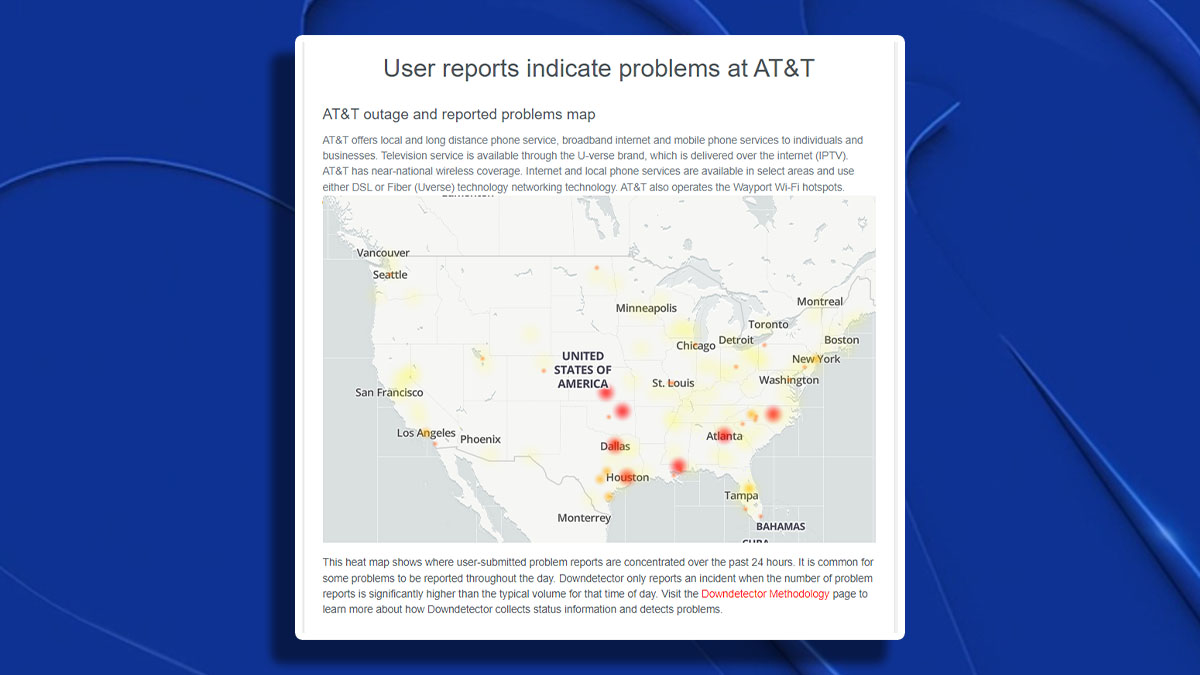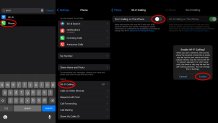A nationwide cellular outage impacted AT&T and other mobile phone customers across North Texas and beyond on Thursday morning.
AT&T, T-Mobile, and Verizon customers began reporting cell service issues at around 2 a.m. Thursday. There also appeared to be service issues with Boost Mobile, Cricket, Consumer Cellular, and other regional services, according to Downdetector.
AT&T, a Dallas-based company, appeared to be the carrier predominately affected by the outage. According to Downdetector, at the peak of the outage, approximately 73,000 AT&T customers were affected across the United States.

Get top local stories in DFW delivered to you every morning. Sign up for NBC DFW's News Headlines newsletter.
"Some of our customers are experiencing wireless service interruptions this morning," AT&T said in a statement. "We are working urgently to restore service to them. We encourage the use of Wi-Fi calling until service is restored.”
Cody Bricker is one of the thousands of customers affected. His personal cell phone and tablet at his family business, Big Daddy Beard run on AT&T’s cell phone service.
“It was the S.O.S., and then it kept saying ‘Searching,'” Bricker said. “We got on our group chat because, of course, you know, it worked on Wi-Fi. We thought it was going to be a whole thing. Luckily, it wasn't.”
Local
The latest news from around North Texas.
Bricker opened their storefront at the Dallas Farmers Market at 10 a.m. and was able to ring up customers.
“Even Apple Pay wouldn't work this morning because of it,” Bricker said. “People carry cash, though. So that's how I took payment this morning.”
Inside the market, other vendors had to lean on each other.
“My mom (was) freaking out because her phone wasn't working, so she had to go talk to one of the other vendors here to borrow their phone,” Joseph Contreras said.
Contreras helps his mother run their business El Mero Mero Tamalero.
“I would say that we probably missed a few orders because we do get like, we have a lot of people that come in the mornings for, like, our breakfast tacos,” Contreras said. “We were able to use cash… it's so funny because, like, no one ever carries cash anymore. And thankfully there is an ATM here.”
Both Verizon and T-Mobile released statements about Thursday's outage saying that they believed the issue to be related to other carriers.
"We did not experience an outage," T-Mobile said in a statement. "Our network is operating normally. Down Detector is likely reflecting challenges our customers were having attempting to connect to users on other networks."
"Verizon's network is operating normally," a Verizon spokesperson said on Thursday. "Some customers experienced issues this morning when calling or texting with customers served by another carrier. We are continuing to monitor the situation."
By late morning, AT&T reported that 75% of its network had been restored. The overall cause of the outage remains unknown at this time.
Thursday afternoon AT&T released a statement saying that wireless service had been fully restored.
“We have restored wireless service to all our affected customers. We sincerely apologize to them. Keeping our customers connected remains our top priority, and we are taking steps to ensure our customers do not experience this again in the future," said an AT&T spokesperson.
The cellular outage was not just an inconvenience for North Texas residents, it also proved to be dangerous as customers had difficulties contacting first responders.
Matt Zavadsky, chief transformation officer at MedStar Mobile Healthcare, spoke with NBC 5 on Thursday morning about how the outage is impacting emergency services. When asked what North Texans should do if they need to call 911 during the outage, Zavadsky said there are some important steps customers can take.
"First is if you have a landline or an internet phone, you can certainly use that," Zavadsky said. "My understanding is that those are still working. If you have not activated Wi-Fi calling on your cell phone, and statistics show that about 85% of the 911 calls placed in this country are placed from a cell phone, activate the Wi-Fi calling so that you can use the Wi-Fi in your house, in your place of business to be able to place that 911 call."
Zavadsky explained that Wi-Fi calling might not provide all of the necessary information to first responders, so customers should be prepared to spend a few more seconds on the phone with emergency services.
"There is a caution people need to be aware of though in that the location automation will not work," Zavadsky said. "So we’re going to take a couple of extra seconds to make sure that we’re certain where you are calling from because it won't show up automatically on our computers."
To turn on Wi-Fi calling, go into your phone settings and search "Wi-Fi," click on "Phone," scroll down to "Wi-Fi Calling," and turn it on. If you receive a pop-up that asks if you want to "Enable Wi-Fi Calling," click the "Enable" button on the right.

Zavadsky also explained that emergency services had to make some drastic changes to their daily routine in response to the cellular network outage. Some first responders had to resort to using maps while responding to requests for service.
"Unfortunately, one of the systems that went down at 2:30 this morning was a system called FirstNet," Zavadsky said. "It's by AT&T and FirstNet is what most public safety agencies across the country use because it was built to be more robust and to have more coverage and to have some features that public safety folks needed. So, when the system went down at 2:30, us, area law enforcement, fire agencies, first responders all over lost connectivity with their field units. So, we had to revert to radio dispatching and actually using maps and ambulances to get to calls because the mapping systems weren’t working because the cell system was down."
According to Zavadsky, the outage occurred during a slower response period.
"No bad outcomes, no real significant issues," Zavadsky said. "Folks switched into the paper mode pretty quickly. And we were able to handle those calls."
Today’s challenges according to Dr. Ravi Prakash, professor of electrical and computer engineering at UT Dallas, a reminder for businesses to be prepared.
“From a technology perspective, it does compel us to think about, what is our backup? Right. Should we have other kinds of backup services,” Prakash said. Moving forward, Zavadsky said Medstar will provide ambulance and field crews with a second option for cell phone service.
"Most of the newer phones today have the opportunity to have two SIM cards, which are the cards that control the phone,” Zavadsky said.
“Our headquarters (already) have that. We have the two internet feeds, one on AT&T, one on Verizon in case one or the other goes down. But we hadn't done that yet for the field units. We're about to do that.”
According to Dallas police, the department is aware of the reported outage and is monitoring the situation. The department has not been impacted by the reported outage, officials said.
Officials said Dallas Police 911 Communications and CAD are both functional and calls are being taken and dispatched.



